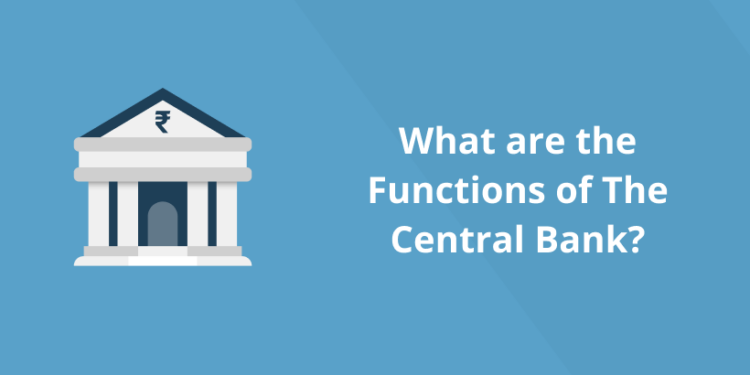The central bank is considered the apex financial institution of the banking system. It is considered an integral part of a country’s economic and financial system. The central bank acts as an independent authority, responsible for overseeing, regulating and stabilizing the monetary and banking structure of the country. In India, the Reserve Bank of India is considered the central bank. It was created in 1935. Central banks are responsible for maintaining the financial stability and economic sovereignty of the country.
Prepare for Bank Exams! Download Entri App!
The functions of a central bank can be described as follows:
- Exchange regulator or issuing bank
- Bank for the government
- Monitor cash reserves
- International Monetary Supervisory Authority
- Lender of last resort
- Transfer and clearing house
- Credit controller
- Protection of depositors’ interests
The functions mentioned above will be described in detail in the following lines.
-
Monetary Authority or Issuing Bank:
Central banks have a monopoly on the production of paper money in an economy. All the central banks in the world are involved in the issuance of paper money for the economy. It is one of the most important functions of a central bank in an economy and for this reason a central bank is also known as an issuing bank. Previously, all banks were allowed to issue their own ratings, which led to a disorganized economy. To avoid this situation, governments around the world have allowed central banks to function as issuers of money, which leads to an even circulation and balance of money supply in the economy.
Download Financial Institutions in India Notes Here!
-
Government Bank:
One of the important functions of a central bank is to act as a government bank. The central bank accepts deposits and funds the government. He is also involved in making and receiving payments to the government. Central banks also provide short-term loans to the government to recover from bad times in the economy. In addition to acting as a government bank, it acts as an advisor and agent to the government by providing advice to the government in the areas of economic policy, capital markets, money markets and government loans. In addition, the central bank plays an important role in planning fiscal and monetary policies to help regulate money in the market and control inflation.
-
Custodian of Cash reserves:
It is a practice of the commercial banks of a country to keep a part of their cash balances in the form of deposits with the central bank. The commercial banks can draw that balance when the requirement for cash is high and pay back the same when there is less requirement of cash. It is for this reason that the central bank is regarded as the banker’s bank. Central bank also plays an important role in the credit creation policy of commercial banks.
-
International Monetary Supervision:
An important function of a central bank is to maintain a minimum balance of foreign currencies. The purpose of maintaining such a balance is to manage sudden or urgent needs for foreign exchange reserves and also to correct any adverse deficit in the balance of payments.
Attempt free Mock Test for Banking! Download Entri App!
-
Clearing Authority:
The central bank acts as the clearing agency for commercial banks and assists in the settlement of mutual debts of commercial banks. In a clearinghouse, representatives of different banks meet and settle interbank payments.
-
Credit control:
Central banks also have the function of controlling credit in the economy. Sometimes commercial banks create more credit in the economy which increases inflation. The central bank controls the way commercial banks create credit by engaging in open market operations or by modifying the CRR to control the credit creation process of commercial banks.
-
Protect the interests of depositors:
The central bank also needs to supervise the activities of commercial banks to protect the interests of depositors.
Ace your Banking Preparation! Download Entri App!
Examples of Central Banks
Some of the famous central banks in the world are
- Federal Reserve (USA)
- Reserve Bank of India (India)
- People’s Bank of China (China)
- Bank of England (UK)
- European Central Bank (EU or European Union)
This concludes our article on the topic of central bank functions, an important topic in economics for business students. For more such great articles, follow Entri.
Entri is a learning platform built by well-known experts in the industry to help students analyze different types of entrance tests without having to worry about learning materials and crash courses. You can take our video analytics and video classes provided by experts to begin preparing for this banking exam and crack it easily.
Take Free Mock Test for Banking Exam! Download Entri App!
We hope you find this article really informative and helpful and also please do not hesitate to contact us for any doubts. You can also download our Entri App for free and start preparing for any competitive exams. This app provides a series of quizzes, Mock tests, PDFs, past question papers, and much more.












